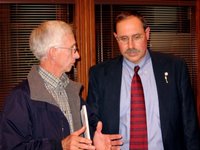
Albert Spencer and Berea Mayor Steve Connelly exchanged thoughts on economic development for the community at the Nov. 13 meeting of the League of Women Voters of Berea & Madison County at Richmond City Hall.
“We think Kentucky’s economy is stuck,” says Justin Maxson, the president of Mountain Association for Community Economic Development as he preached a new strategy at the Nov. 13 meeting of LWV in Richmond City Hall.
“We continue to invest in economic development strategies that are not giving us the type of returns we need,” Maxson said. The lack of results are felt particularly in eastern Kentucky counties, where leaders feel that current industrial recruitment strategies can’t help their economies, he added.
“What do they think? We will outpoor China?” Maxson was asked by a Wolfe County official.
Industrial recruitment relies on cheap wages but since conditions have changed in the global marketplace, “we can not offer the cheapest conditions for a company to come into,” Maxson said. “It’s pretty clear that they were not going to get a Toyota in Campton.”
Maxson’s organization, MACED, has joined with Kentuckians for the Commonwealth and other organizations and individuals to propose new strategies for economic development in the state.
They are planning to present a small package of proposals to the upcoming short session of the General Assembly in order to “create a buzz” that they hope will resonate in the 2007 race for governor.
“We are glad to give away our platform to anyone who will pick it up,” Maxson said.
Accountability missing
One of their reforms will call for scrutiny of existing spending on economic development, especially in the area of tax breaks that rarely get evaluated once they are approved.
Maxson discussed MACED’s 2005 analysis of how much money is spent on industrial recruitment/economic development. The research was hampered by a glaring lack of information. The state does not reveal details about the efficacy of its incentives and tax credits to individual businesses, Maxson said.
Most agencies such as those that deal with child poverty are required to submit spending requests and lobby for scarce dollars in each new budget.
In contrast, much of the $808 million spent in the area of economic development, is unexamined by the legislature, the study revealed. Seventy percent comes from “tax expenditures” or exemptions for special industries, such as sales tax on coal or on the sale of horses for breeding purposes in the state.
Some of this information may become public after a study by the University of Kentucky is completed at the end of this year. UK was given access to the deal-level data in a study authorized by the 2006 legislature.
Knowing more about the type of deals that the state makes with industrial prospects should lead to more strategic planning. Maxson questioned the decision making of Kentucky’s economic development strategy in the case of Tantus Tobacco Company, which was given a cash grant and $2 million in income tax credits to bring 30 jobs to a plant in Russell Springs that makes “value-priced” cigarettes and little cigars.
“In a state that spends $1.2 billion a year to treat sick smokers,” Maxson questioned the logic of such an investment.
Maxson called for a new strategy based on what is being called “high road economic development.”
Investing locally
Parts of the strategies can be discovered in how MACED has disbursed over $4 million in loans last year to small business enterprise in eastern Kentucky.
Some approaches that Maxson suggests should be incorporated into high road economic development include the following:
How should economic development dollars be spent?
• It should be strategic, based on the assets and livable conditions that exist in the community.
• It should consider recruitment of specific “clusters” — companies that do similar things; “There are benefits if we focus recruitment or development of a collection of companies that produce a similar product that share particular applications, assets and research,” Maxson said.
• Strategies should focus on revitalizing local economies and thinking of ways to expand local businesses to the next county or regionally;
• A promising area for targeted economic development is investment in alternative energy enterprises, such as bringing in a solar panel company to Kentucky. As concern grows about energy sources that produce carbon dioxide, such as coal: “We could grow jobs in an area that is going to be more and more important as alternative fuels to produce electricity come to the forefront,” Maxson said.

